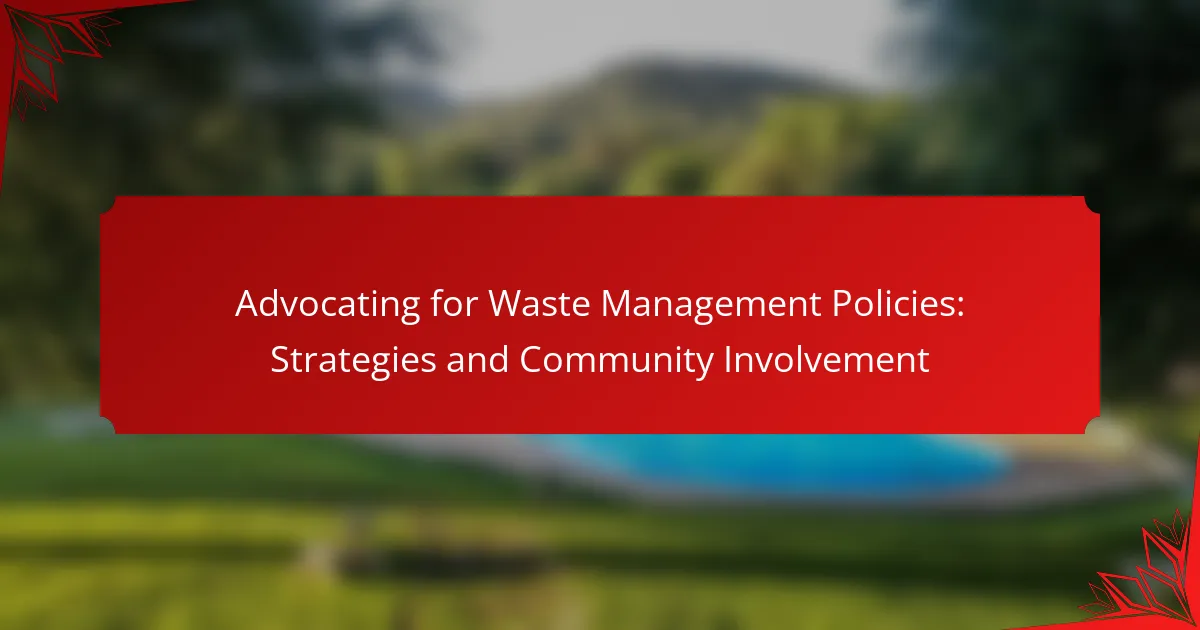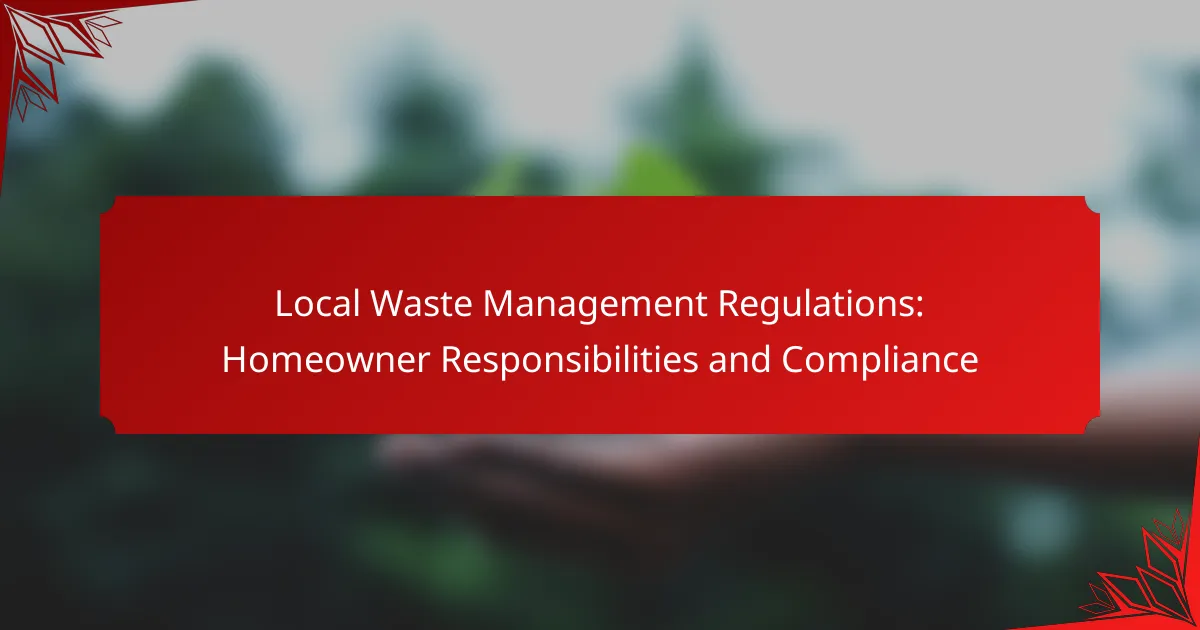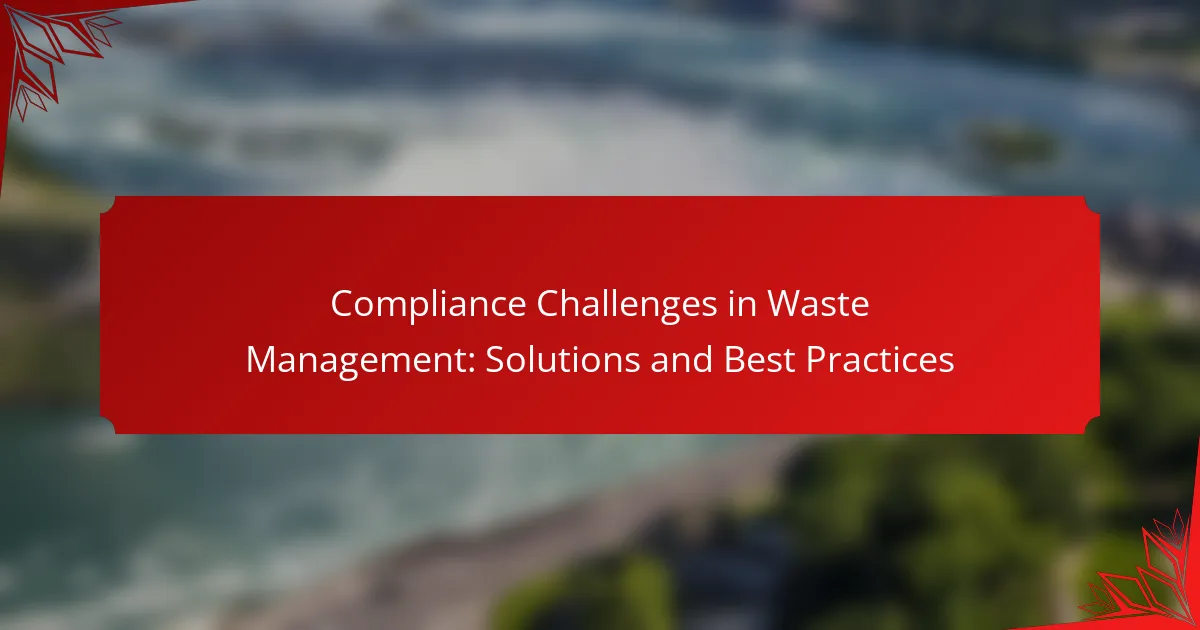Advocating for effective waste management policies is essential for creating sustainable urban environments. By focusing on waste reduction, recycling, and proper disposal, communities can significantly minimize their environmental impact while fostering greater awareness and participation among residents. Engaging with local governments and stakeholders is crucial in shaping policies that promote responsible waste management practices.
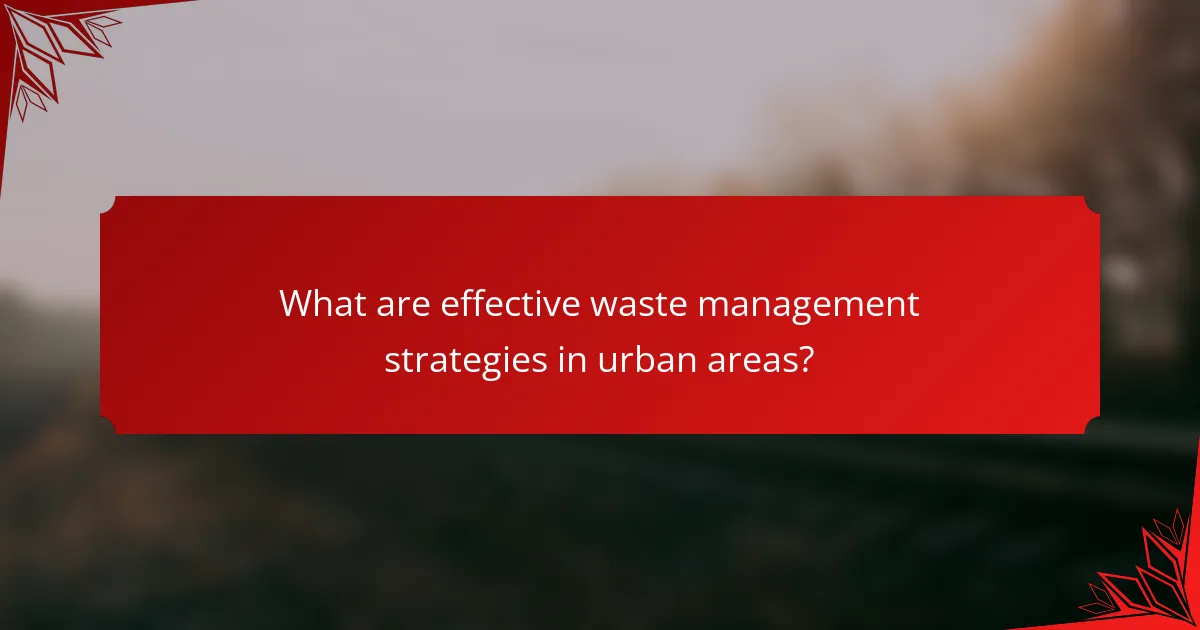
What are effective waste management strategies in urban areas?
Effective waste management strategies in urban areas focus on reducing waste generation, promoting recycling, and ensuring proper disposal. These strategies not only minimize environmental impact but also enhance community involvement and awareness.
Source separation programs
Source separation programs involve the segregation of waste at the point of disposal, allowing for easier recycling and composting. Residents are typically provided with separate bins for recyclables, organic waste, and general trash.
To implement a successful program, municipalities should educate residents on what materials belong in each bin. Clear labeling and regular reminders can significantly increase participation rates and reduce contamination.
Composting initiatives
Composting initiatives turn organic waste into valuable compost, which can be used to enrich soil. Urban areas can establish community composting sites or provide residents with home composting kits.
Encouraging participation through workshops and providing resources on composting techniques can help residents understand the benefits. Successful programs often see a reduction in organic waste sent to landfills by a significant percentage.
Recycling education campaigns
Recycling education campaigns aim to inform the community about the importance of recycling and how to do it correctly. These campaigns can include workshops, informational flyers, and social media outreach.
Effective campaigns often highlight the environmental benefits of recycling, such as reducing landfill waste and conserving resources. Engaging local influencers or community leaders can enhance outreach and participation.
Waste-to-energy facilities
Waste-to-energy facilities convert non-recyclable waste into energy through combustion or other processes. This method reduces the volume of waste sent to landfills while generating electricity or heat.
While these facilities can provide a sustainable energy source, they require careful planning and community support. Transparency about emissions and environmental impact is crucial to gaining public trust.
Community clean-up events
Community clean-up events encourage residents to take an active role in maintaining their local environment. These events can be organized by local governments, non-profits, or community groups and often involve collecting litter from parks, streets, and waterways.
To maximize participation, organizers should promote the event through local media and social networks. Providing incentives, such as refreshments or community service hours, can also motivate residents to join in and foster a sense of community pride.
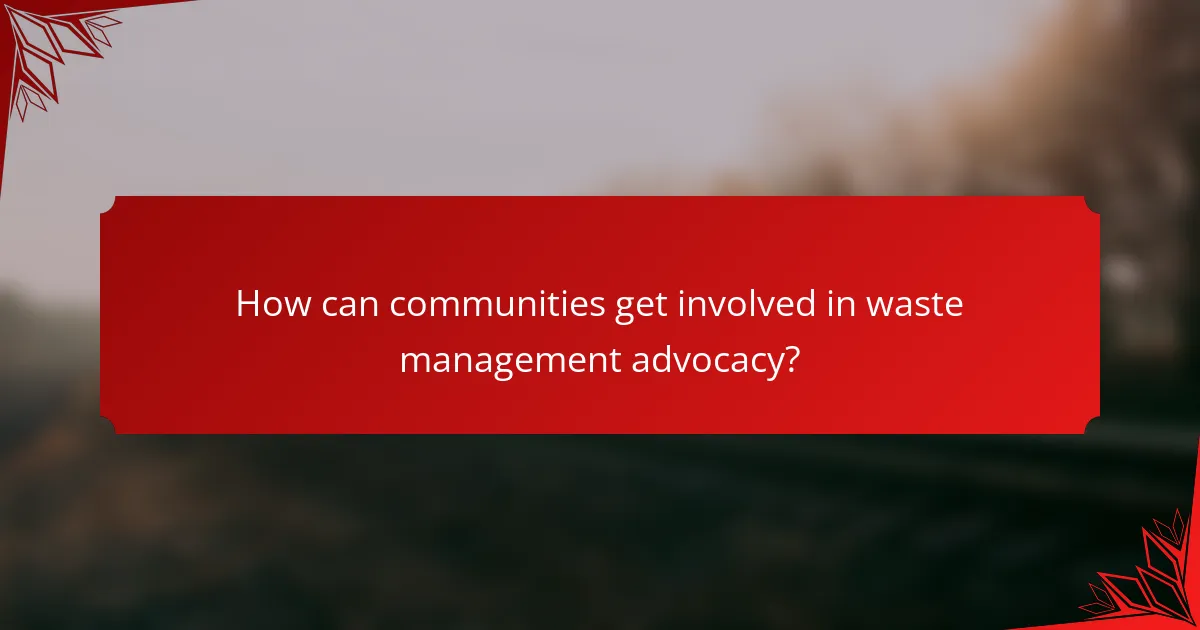
How can communities get involved in waste management advocacy?
Communities can play a vital role in waste management advocacy by actively participating in decision-making processes and promoting sustainable practices. Engaging with local government, organizations, and residents fosters a collective effort towards effective waste management solutions.
Participating in local government meetings
Attending local government meetings is a direct way for community members to voice their concerns and suggestions regarding waste management policies. These meetings often include discussions on budget allocations, new initiatives, and regulations that affect waste disposal and recycling.
To maximize impact, prepare specific questions or proposals in advance. Consider attending meetings regularly to stay informed and build relationships with local officials, which can enhance your advocacy efforts.
Joining environmental organizations
Joining environmental organizations can amplify your voice in waste management advocacy. These groups often have established networks and resources that can help you understand local issues and connect with like-minded individuals.
Look for organizations that focus on waste reduction, recycling, or sustainability initiatives in your area. Participating in their events or campaigns can provide valuable insights and opportunities to contribute to larger advocacy efforts.
Organizing community workshops
Organizing workshops within your community can educate residents about waste management practices and encourage participation in advocacy. Topics can include recycling techniques, composting, and reducing single-use plastics.
Consider collaborating with local experts or organizations to lead these workshops. Providing hands-on activities can enhance engagement and help participants develop practical skills for better waste management.
Engaging in social media campaigns
Social media campaigns are an effective way to raise awareness about waste management issues and mobilize community action. Platforms like Facebook, Twitter, and Instagram can help spread information quickly and reach a broader audience.
Create content that highlights local waste management challenges and solutions, and encourage community members to share their experiences. Use relevant hashtags to increase visibility and connect with other advocates working towards similar goals.
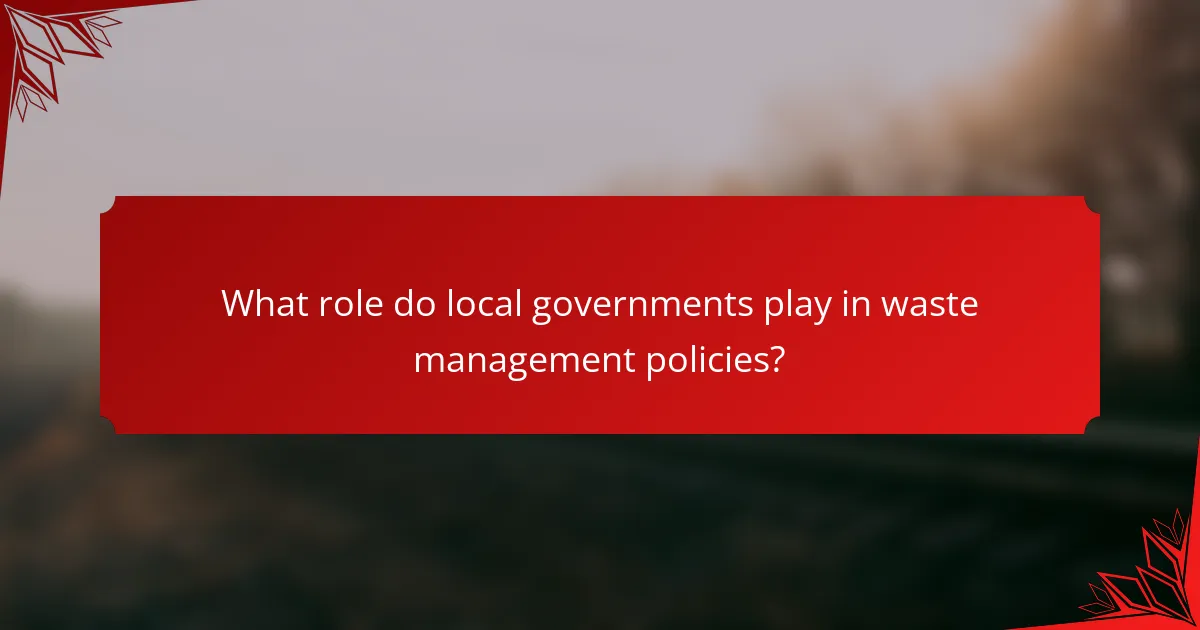
What role do local governments play in waste management policies?
Local governments are crucial in shaping and enforcing waste management policies that ensure effective waste disposal and recycling practices. They create regulations, allocate funding, and engage with community stakeholders to promote sustainable waste management solutions.
Implementing regulations and ordinances
Local governments establish regulations and ordinances that dictate how waste is collected, sorted, and disposed of. These rules can include mandatory recycling programs, restrictions on certain types of waste, and penalties for non-compliance. For example, many municipalities have laws requiring businesses to separate organic waste from general trash.
Effective implementation of these regulations requires clear communication and education for residents and businesses. Local governments often conduct outreach programs to inform the community about new policies and the importance of compliance.
Funding waste management programs
Funding is essential for local governments to develop and maintain effective waste management programs. This can come from various sources, including local taxes, state and federal grants, and fees for waste collection services. For instance, some cities charge residents a monthly fee based on the volume of waste they generate.
Local governments must prioritize their budgets to ensure sufficient resources are allocated for waste management initiatives, such as upgrading recycling facilities or expanding composting programs. Regular assessments of funding needs can help identify gaps and opportunities for improvement.
Collaborating with community stakeholders
Collaboration with community stakeholders, including residents, businesses, and non-profit organizations, is vital for successful waste management policies. Local governments can engage these groups through public meetings, surveys, and partnerships to gather input and foster a sense of ownership in waste management efforts.
Building strong relationships with stakeholders can lead to innovative solutions and increased participation in waste reduction initiatives. For example, local governments might work with schools to implement educational programs that encourage recycling and waste reduction among students and their families.
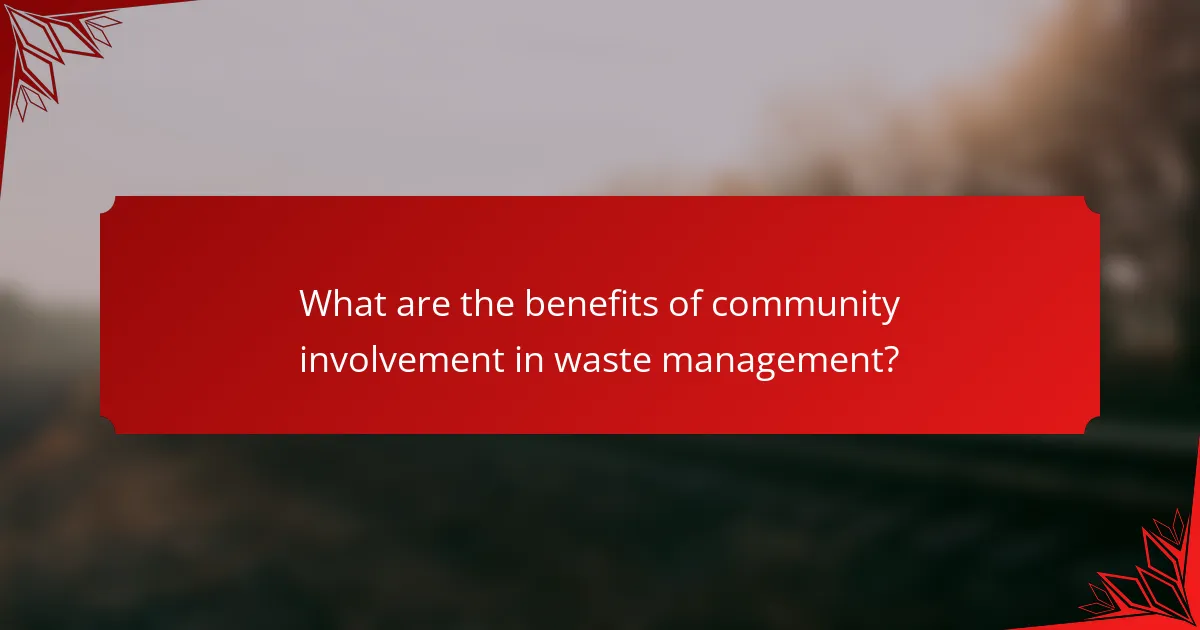
What are the benefits of community involvement in waste management?
Community involvement in waste management leads to improved environmental outcomes, increased public engagement, and stronger local ties. By actively participating in waste management initiatives, residents can influence policies, promote sustainable practices, and foster a sense of responsibility towards their environment.
Increased public awareness
When communities engage in waste management efforts, public awareness about the importance of proper waste disposal and recycling practices rises significantly. Educational programs, workshops, and local campaigns can inform residents about the environmental impact of waste and the benefits of reducing, reusing, and recycling materials.
For example, organizing clean-up events or recycling drives can serve as practical learning experiences, helping residents understand how their actions contribute to a cleaner community. This heightened awareness often translates into more responsible behavior regarding waste management.
Enhanced community pride
Active participation in waste management initiatives fosters a sense of pride among community members. When residents work together to improve their environment, they develop a stronger connection to their neighborhood and a shared commitment to its upkeep.
Communities that successfully implement waste management programs often see improvements in public spaces, which can lead to increased property values and a more attractive living environment. Celebrating achievements, such as awards for cleanliness or successful recycling rates, can further boost community morale.
Improved waste reduction rates
Community involvement directly correlates with improved waste reduction rates. When residents are educated and motivated to participate in waste management, they tend to adopt more sustainable practices, such as composting and recycling.
For instance, communities that implement local recycling programs often see diversion rates rise significantly, sometimes reaching over 30% of total waste. Encouraging participation through incentives, such as discounts for reduced waste or rewards for recycling, can further enhance these rates and promote a culture of sustainability.
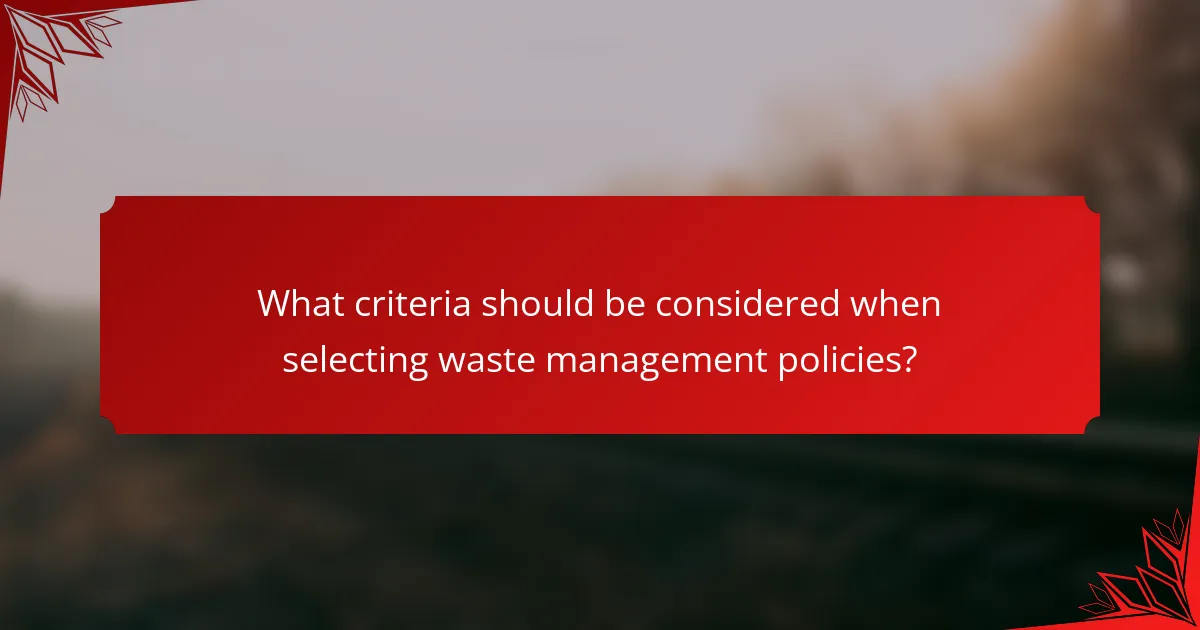
What criteria should be considered when selecting waste management policies?
When selecting waste management policies, key criteria include environmental impact, economic feasibility, and community engagement. These factors ensure that policies are sustainable, cost-effective, and supported by the local population.
Environmental impact assessments
Environmental impact assessments (EIAs) evaluate the potential effects of waste management policies on the environment. They consider factors such as air and water quality, biodiversity, and land use, helping to identify any negative consequences before implementation.
When conducting an EIA, it is essential to gather baseline data on current environmental conditions and project potential changes. This process often involves public consultations to incorporate community concerns and insights, which can lead to more effective waste management strategies.
To ensure a thorough assessment, follow established guidelines such as those from the International Association for Impact Assessment (IAIA). These guidelines can help frame the evaluation process, ensuring that all relevant environmental aspects are considered and addressed.
